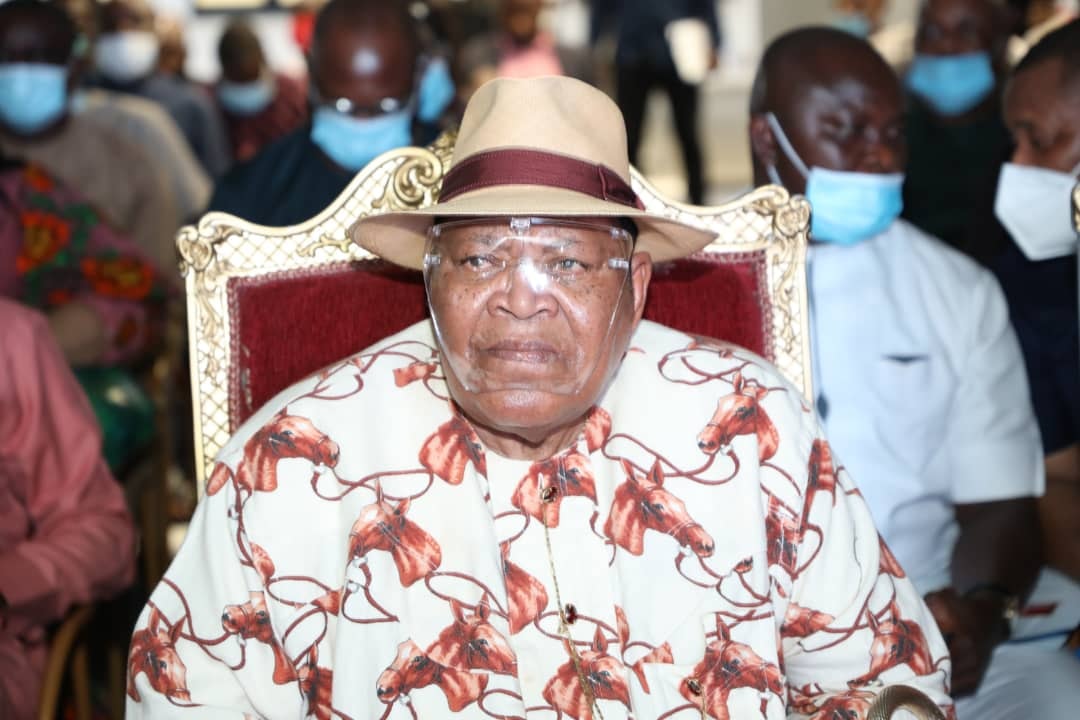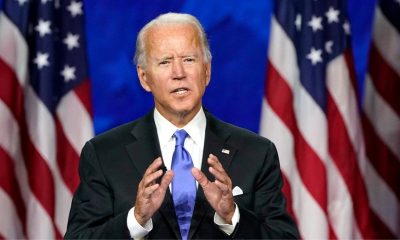News
Constitutional Review: Lawan Solicits Role For Monarchs In Governance

President of the Senate, Dr Ahmad Lawan, has identified the exclusion of the traditional rulers in governance and security architecture of the nation as one loophole in the 1999 Constitution which had largely aided the growth in Nigeria’s security challenges.
In same vein the National Council of Traditional Rulers in Nigeria (NCTRN) have described the neglect of the traditional rulers in governance as a disrespect to the nations roots capable of creating dangerous gaps, misunderstandings and avoidable conflicts between the grassroots and the government.
Lawan made the disclosure, yesterday, in his speech as he declared open a meeting between the Constitution Review Committee of the Senate chaired by the Deputy President of the Senate, Senator Ovie Omo-Agege-led and the National Council of Traditional Rulers in Abuja.
The Senate President, in his remarks, called for roles for traditional rulers in the Constitution linked to specific functions for them in guaranteeing the safety of lives and properties within their various jurisdictions.
According to Lawan, the worsening activities of insurgents, bandits and criminals have placed Nigeria in a dire situation that demands an urgent review of the 1999 Constitution along the lines of reorganizing the structure of governance to give specific roles to traditional rulers in various communities, as well as the incorporation of traditional institutions as part of the security architecture of the country.
Lawan said, “I’m here to show the commitment of the National Assembly in its entirety, to listening and supporting our royal fathers on the Constitutional Review currently going on, and in what many of us believe that is the right thing; that we have our royal fathers properly and formally given some roles in the governance structure or the administration of our country.
“The pre-colonial, colonial and post-colonial history of our royal fathers gives us indication of how important our traditional institution was in those days.
“In fact, at the risk of going into some avoidable history, in 1947 the British created a single traditional institution for the Tivs by creating the title of Tor Tiv. This was because they knew that the traditional institutions were playing very critical and crucial roles in running the affairs of those they governed.
“Probably, the 1979 Constitution had envisaged specific functions for the traditional institutions, but I think we missed it after that, and maybe the 1999 Constitution did not take account of certain things that could have been helpful.
“Maybe before the 1976 local government reforms, the traditional institutions might have played some roles in ensuring that our communities were secured and safe.
“So, what do we need to do to bring our country into a safer climate and more secured life for our people and their property?
“I believe that we need to take a holistic assessment of our situation. Every community, every people makes law for itself to specifically deal with some challenges, and you don’t have to copy what works elsewhere, because your history may be different. So, we have a very peculiar history when it comes to our traditional institutions playing some roles in the affairs of our people.
“This is an opportunity for our traditional institutions to ask for specific roles, but our desire as a National Assembly is to undertake this Constitutional Review because it is part of a very important legislative agenda, and also our desire to continuously work as a Legislature with the Executive arm of government to create a safer and more secured Nigeria.
The Senate President noted that the current security architecture should not be limited to the armed forces, police and other paramilitary organizations alone.
“If our traditional institutions would be part of our security architecture, so be it. Actually, what we need is to secure the lives and properties of our people. How do we achieve that? This is where the meeting of today, between our Constitution Review Committee headed by the Deputy President of the Senate, and the National Council of Traditional Rulers would be very critical”, Lawan said.
Presenting a memorandum of the National Council of Traditional Rulers of Nigeria signed by the Chairman and the Sultan of Sokoto, Alhaji Muhammad Sa’ad Abubakar; and the Co-Chair and the Ooni of Ife, Oba Adeyeye Enitan Ogunwusi, to the Constitution Review Committee, the Etsu Nupe, Alhaji Yahaya Abubakar, recalled that the Nigerian First Republic Regional Governments had bi-cameral Legislative arrangement with the Houses of Chiefs serving as the Upper chambers to those of the elected Houses of Assemblies.
“The society was at that time progressive, peaceful, decent and full of beautiful traditions and cultures. Lives and properties were sacrosanct and accountability and honesty were the hallmarks of the traditional local Administrations,” he said.
According to him, “General Ironsi 1966 Unitary Government Decree, General Gowon’s and General Obasanjo’s 1967 and 1976 Local Government Reform Decrees, respectively stripped traditional rules of their powers and gave same to the local government council thereby giving birth to the present insecurity and corruption, constitutionally and protocol wise, traditional rulers are relegated to the background.”
The Etsu Nupe lamented that under the present arrangement, “Traditional Rulers do not have the constitutional or other legal backing to perform effectively as they are not even mentioned in the 1999 Constitution.”
“This is a great departure from all earlier Constitutions that recognised them and even gave them some functions to perform.
“Indeed, all the Nigerian earlier Constitutions gave the chairmen of the States Councils of Chiefs seats in the National Council of State alongside former Presidents, Chief Justices, etc. For example, this is clearly provided for under Section 140 (l) and under Part 1 of the Third Schedule of the 1979 Constitution,” he added.
The traditional ruler, however, emphasized that “no community or nation would thrive successfully without due consideration of its historical evolution, customs, values and beliefs”, adding that, “the Nigerian Nation evolved from the amalgamation of several empires, kingdoms, caliphates, chiefdoms and autonomous communities.”
“Undermining the traditional institution through unsavoury politically motivated actions will reduce the respect accorded it by the citizenry.
“This will translate into its ineffectiveness in performing its roles. It will also affect its capacity to mobilize the people towards government programmes and projects and in managing communal, ethnic and religious conflicts and crisis.
“This will certainly not augur well for the envisaged peace, progress and wellbeing of the Nation and its people as the government will lose a respected willing partner in these regards”, he warned.
The Etsu Nupe while calling on the National Assembly to intervene in safeguarding the sanctity of the traditional institution by ensuring its insulation from politically motivated actions that run afoul of the well-established traditional settings advised that traditional rulers should be accorded specific responsibilities for conflict and security management in their domains.
He added that, “Nigeria needs to explore all available means of conflict resolution, intelligence gathering and containment of insecurities that will complement the conventional security outfits.”
The Chairman of the Constitution Review Committee, and Deputy Senate President, Ovie Omo-Agege, in his speech, raised questions on why the institution was expunged in the Constitution in the first place, if it had fostered peaceful coexistence and safety of lives and property.
His words, “What you’re seeking here today, is the reinstatement of the Council of Traditional Rulers that we had in all of our previous Constitutions which was omitted in the 1999 Constitution. The question becomes, why was there that omission?”
“With respect to this request, it shouldn’t be very demanding because we all come constituencies and we are all your subjects.
“At a time like this when we have so much insurgency in the North-East, banditry in the North-West and most of the North-Central, the same challenges we also have in the South-South, South-East and South-West; with religious tension everywhere, if His Royal Highness said that in Colonial and Pre-Colonial and Post-Colonial times, that there was need to maintain the status of traditional institutions to help us preserve peace, now is even more apt today than it was.
The NCTRN was represented by traditional rulers drawn from the six geopolitical zones of the country.
By: Nneka Amaechi-Nnadi, Abuja
News
NASS commends FIRS for surpassing 2024 target, sets 2025 goal

The National Assembly has lauded the Executive Chairman of the Federal Inland Revenue Service (FIRS), Mr Zacch Adedeji, for exceeding the 2024 revenue collection target of N19.4 trillion.
FIRS generated N21.6 trillion, surpassing the target by N2.2 trillion.
The commendation came during a meeting on Wednesday in Abuja, where the FIRS chairman appeared before the joint committee on Finance to defend the service’s revenue projections for 2025.
The committee proposed a N25 trillion revenue generation target for FIRS in the coming fiscal year.
Deputy Chairman of the House of Representatives Committee on Finance, Saidu Abdullahi, was the first to commend Adedeji’s performance, calling it “unprecedented” and “worthy of commendation.”
“The feat achieved by FIRS in revenue collection for 2024 was unprecedented and truly commendable.
“Surpassing the target set for the agency in the 2024 Appropriation Act, from N19.4 trillion to N21.6 trillion, is both encouraging and impressive,” he said.
He encouraged the FIRS to study the tax collection methods of South Africa, which generated higher tax revenue, and to focus on expanding the taxable base to include more informal sector workers.
Sen. Joel Onowakpo emphasised that tax collection was a global norm, and advised the committee to raise FIRS’s projected 2025 revenue target to N30 trillion.
Similarly, Sen. Binos Yeroe lauded Adedeji’s innovative approach in surpassing the 2024 target.
“Your performance in 2024 was highly commendable, and I hope you continue to maintain this level of success,” he said.
Rep. Etanabene Benedict suggested aiming for N60 trillion in 2025 to avoid borrowing.
Committee chairmen also supported the proposed N25 trillion revenue goal for 2025; with Sen. Sani Musa stating that it was both “achievable and surpassable.”
News
Abbas, Kalu express grief over Deputy Chief Whip, Onanuga’s death

Speaker of House of Representatives, Tajudeen Abbas, has expressed deep grief over the demise of the Deputy Chief Whip of the house, Rep. Adewunmi Onanuga.
In a statement on yesterday, Abbas described the late lawmaker as a strong pillar who would be sorely missed in the house.
The Tide source reports that Onanuga, who died on Wednesday, represented Ikenne/Sagamu/Remo North Federal Constituency and was serving her second term in the house.
Abbas said that he had led members of the house in support and prayers for Onanuga during her health challenge and was hopeful of her recovery, saying that her eventual death was painful.
He recalled Onanuga’s campaigns for gender equality, women empowerment and inclusion in politics and governance, as Chairman, House Committee on Women Affairs and Social Welfare in the Ninth House and as a principal officer in the 10th House.
Abbas also recalled how the late lawmaker, as the only female member in the leadership of the house, inspired and rallied female legislators for the greater good of the chamber and the country in general.
“Onanuga was a brilliant woman, experienced politician, resourceful lawmaker and a dependable ally in the legislative business,” he said.
Abbas commiserated with the Onanuga family and her constituents, the people and the government of Ogun as well as the All Progressives Congress (APC) on the demise of the legislator.
Also, the Deputy Speaker, House of Representatives, Rep. Benjamin Kalu, expressed sadness over Onanuga’s death.
Kalu described the deceased as a shining example of dedication, compassion and selfless lawmaker whose service to her constituents and the nation was outstanding.
He acknowledged her support for the Peace In South East Project (PISE-P), which demonstrated her passion for defeating insecurity in Nigeria.
“Onanuga was a dedicated and committed lawmaker, renowned for her unwavering commitment to peace.
“Her passion for promoting harmony and understanding was truly commendable. Beyond her legislative accomplishments, Onanuga’s compassion, humility and simplicity inspired countless individuals.
“Her warm and infectious smile, coupled with her empathetic nature, endeared her to everyone she met, making her a beloved figure in the lives of many,” he said.
Kalu said that Onanuga would be remembered for her commitment to the cause of women’s empowerment and political inclusion as well as her relentless efforts toward ensuring that the gender bills were passed.
The deputy speaker extended his heartfelt condolences to the Onanuga family, her colleagues and constituents, saying that she would be greatly missed.
He prayed for the peaceful repose of the soul of the late lawmaker and the fortitude to bear the loss.
News
Rotary Foundation commits $300m to polio eradication in Nigeria

The Rotary International Foundation says it has committed over 300 million dollars to polio eradication in Nigeria.
Its Chairman, Board of Trustees, Mark Maloney, disclosed this on Thursday while conducting polio immunisation at a Primary Healthcare Centre in Jahi, Abuja.
According to him, polio eradication is Rotary’s number one priority worldwide and it is focused on eradicating the variant type two poliovirus cases discovered in 2024.
Maloney said efforts towards eradicating the polio variant should be intensified, adding that recording success in that area would be beneficial to the Nigerian government.
He also commended the Federal Government’s polio accountability programme as well as all Rotarians for their efforts in putting an end to the disease.
“The Nigerian government is facing a significant challenge with the continuation of variant polio type two, and so far, we have seen about 92 cases through the cases that have been evaluated in 2024.
“We encourage the government to redouble their efforts to put the focus on this polio eradication as they did with the Wild Polio Virus (WPV), and they were successful.”
On new donations to Nigeria, Maloney said that Rotary would allocate some funds in 2025, but the amount was yet to be determined.
“There are 50 million dollars that I expect will be allocated, but a lot of it has to go to Pakistan and Afghanistan, where WPV is still endemic.
“Though, I think there will be a significant tranche of funds, maybe not tens of millions, but a significant amount of money will be allocated to Nigeria,” he added.
The chairman noted that the organisation has allocated two million dollars to its Programme of Scale project aimed at reducing the rate of birth-related mortality in Nigeria.
“What we are looking to do is to decrease the rate of mortality in births in this country, and it is operating now in several districts.
“One way that the mortality rate can be decreased is for more births to happen in a healthcare facility rather than at home.
“We have seen in the first year of the programme a significant increase in the percentages of births happening in medical facilities.
“One district had gone from 11 per cent happening in medical facilities to 33 per cent, which is a significant increase,” he added.
The Chairman of the organisation’s Nigeria National Polio Plus Committee, Mr Joshua Hassan, said outbreak immunisation efforts are conducted locally in response to the vaccine-derived variant of polio.
Hassan said national immunisation days are planned twice a year for the entire country.
According to him, the organisation is focusing more of its efforts on Kano, Zamfara, Katsina, Kebbi, and Sokoto states.
Prof. Emmanuel Lufadeju, the National Coordinator of Together for Healthy Families in Nigeria, said that the Programme of Scale project was designed to reduce maternal mortality among women by 25 per cent.
Lufadeju said that this is done through community dialogue, home outreaches, medical outreaches, and capacity building.
“We are going to train a lot of people, including doctors and nurses.
“Then we are going to do something that is called a social, behavioural change, to change the attitude of people and make them deliver in the facility instead of delivering at home.”
He added that the two million dollar project, which began in 2024, is expected to end in 2025.
The Tide source reports that Maloney is in Nigeria for an official visit to embark on advocacy, carry out symbolic immunisation, visit the Programme of Scale project areas, and also visit President Bola Tinubu.
-
News5 days ago
RSG Confirms Nine Deaths From Cholera Outbreak
-
Rivers5 days ago
Omuma LGA Boss Inaugurate 11 man Scholarship Board
-

 News5 days ago
News5 days agoAbbas, Kalu express grief over Deputy Chief Whip, Onanuga’s death
-
Niger Delta5 days ago
Diri Gives Stewardship On Infrastructure Development
-
News5 days ago
Govs Back Tax Reform Bills, Reject VAT Increase
-

 Featured5 days ago
Featured5 days agoTinubu congratulates Nigerian scientists, engineers on making Biden’s honour list
-

 News5 days ago
News5 days agoNASS commends FIRS for surpassing 2024 target, sets 2025 goal
-
Business5 days ago
CBN Slams N1.34bn Fine On 9 Banks With Indespencable ATMs …Reiterates validity of old N1000, N500, N200 denominations

